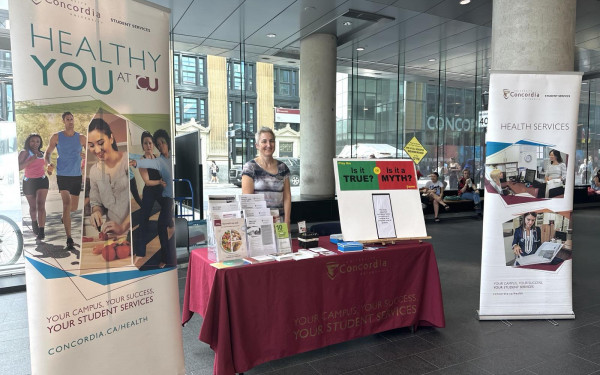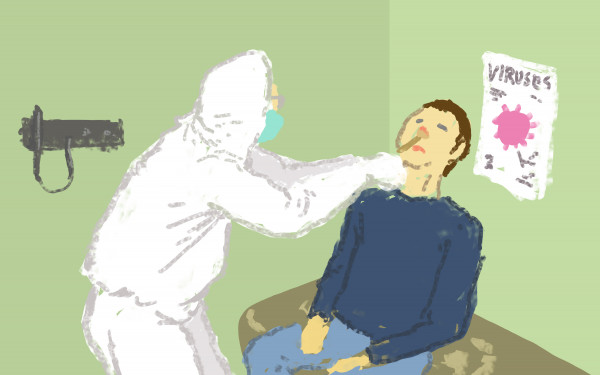Don’t Get Bested, Get Tested
A Guide to Free STBBI Clinics in Montreal
Sexually active Canadians under the age of 25 are the most at-risk demographic for sexually transmissible blood borne infections, according to Health Quebec.
Any health professional, including nurse Harpuneet Kaur from the CLSC Benny Farm, will tell you that in order to stay safe, a healthy sex life requires to get tested at least every six months or every time you have a new sexual partner.
Furthermore, the provincial government recommends all individuals who “have had unprotected sex, shared equipment used to prepare, inject or inhale drugs, had a tattoo or piercing done with non-sterile equipment, had sex with someone who has an STBBI, or have symptoms similar to those of an STBBI at least once” to alert their sexual partners and get tested as soon as possible.
Contrary to popular belief, sexually transmitted and blood-borne infections don’t always have alarming symptoms—carriers can sometimes unknowingly infect their partners, which is why regular upkeep is so crucially important.
Just as important is the accessibility and affordability of said testing, so that these recommendations can realistically be met.
STBBIs have significantly increased over the last 10 years, Health Canada reports. Chlamydia infections have increased by over 30 per cent, Gonorrhea rates have almost tripled and Infectious syphilis rates have increased by over 300 per cent.
While Quebec offers free testing services for Canadians at any CSLC, the system suffers from heavy overload, meaning booking an appointment can be challenging. At time of writing, the CLSC Metro at Guy-Concordia is fully booked until at least the end of May 2023.
Appointments can only be made through Clic Santé, Quebec’s healthcare portal. For those who manage to book a slot, CLSCs offer STBBI screenings, consultations for contraception, follow-ups and guides on how to prevent STBBIs.
“Practicing safe sex is not only about contraception, but also keeping up to date with our own health and paying attention to our bodies,” Kaur said. She also stated the importance for young adults to wear condoms and to incorporate STBBI testing into their regular check-ups.
These services are free in CLSCs for all Canadians because they are covered by the public health system. For those who are not Canadian citizens, there are fees ranging from $5 to $15, depending on the services needed.
In addition to the multiple CLSCs spread across Montreal, some clinics specialize in young people under the age of 25 to offer more booking availabilities. The SIDEP+ clinics in the Gay village and Montérégie provide free services for gay, bisexual and other men who have sex with men, whether cisgender or transgender.
If you are due for a screening test, Clic Santé’s website should have at least one location with availabilities within one week, but not all of those are part of the public health system, so fees can apply.
Testing Sites:
CLSC Métro
1801 de Maisonneuve W. Blvd., Montréal, QC H3H 1J9
CLSC de Parc-Extension
7085 Hutchison St., Montreal, QC H3N 1Y9
CLSC Côte Des Neiges
5700 Côte-des-Neiges Rd., Montréal, QC H3T 2A8
CLSC de Benny Farm
6484 Ave. de Monkland, Montréal, QC H4B 1H3
Other locations:
66 St Catherine St E, Montreal, Quebec H2X 1K6
5700 Ch. de la Côte-des-Neiges, Montréal, QC H3T 2A8
400 Rue de l'Église, Verdun, QC H4G 2M4
6161 Laurendeau St, Montreal, Quebec H4E 3X6
3833 Notre-Dame St W, Montreal, Quebec H4C 1P8
1705 Visitation St, Montreal, Quebec H2L 3C3
2260 Rue Parthenais, Montréal, QC H2K 3T5
4625 Av. De Lorimier, Montréal, QC H2H 2B4
15 Mont-Royal Ave W #100, Montreal, Quebec H2T 2R9
This article originally appeared in Volume 43, Issue 9, published January 10, 2023.






_600_375_90_s_c1.jpg)
